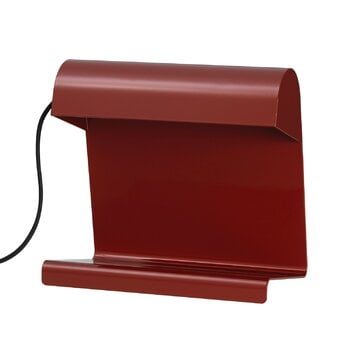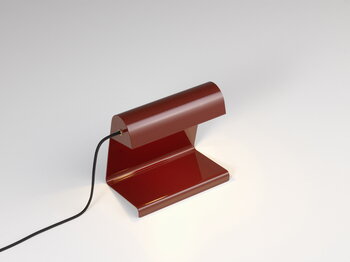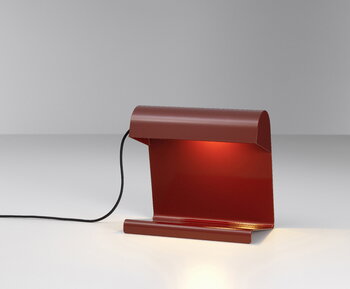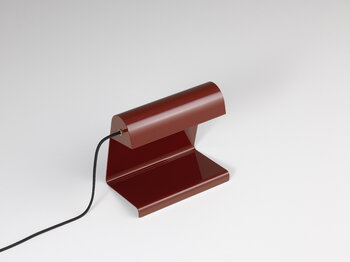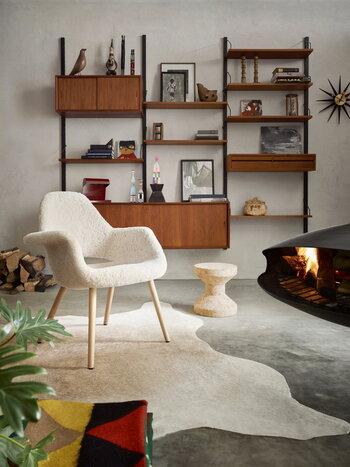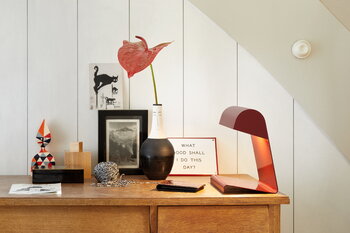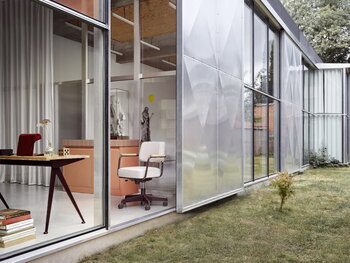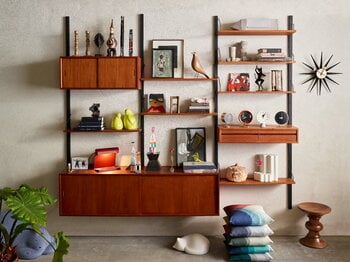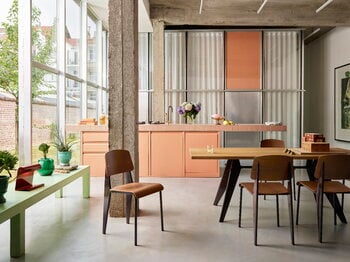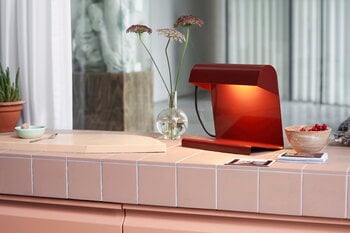Vitra’s Lampe de Bureau is a classic French table lamp designed by Jean Prouvé in the 1930s. Prouvé designed Lampe de Bureau originally for the halls of residence at the Cité Universitaire in Nancy, France, and its clean, functional design is well suited also for modern interiors of today. Made of bent sheet steel, Lampe de Bureau reflects downward, glare-free light, and its lower level can be used for storing small items, such as pens or notes. Powder-coated with the original hues by Prouvé, Lampe de Bureau makes an excellent desk light both at home and the office.
Lampe de Bureau table lamp, Japanese red
Vitra
Description
Vitra’s Lampe de Bureau is a classic French table lamp designed by Jean Prouvé in the 1930s. Prouvé designed Lampe de Bureau originally for the halls of residence at the Cité Universitaire in Nancy, France, and its clean, functional design is well suited also for modern interiors of today. Made of bent sheet steel, Lampe de Bureau reflects downward, glare-free light, and its lower level can be used for storing small items, such as pens or notes. Powder-coated with the original hues by Prouvé, Lampe de Bureau makes an excellent desk light both at home and the office.
Product details (18)
- Material
- Powder-coated sheet steel
- Colour
- Japanese red
- Width
- 24 cm
- Depth
- 14.5 cm
- Height
- 22.5 cm
- Bulb base
- E14
- Light source
- Max. 12W LED candle bulb (included)
- Colour temperature
- 2,700 K
- IP rating
- 20
- Voltage
- 220–240 V
- Nominal frequency
- 50–60 Hz
- Certifications and labels
- CE marked: tested and approved according to European standards
- Plug
- EU plug
- Cable length
- 250 cm
- Cable colour
- Black
- Cable material
- Textile
- Integrated switch
- Yes
- Dimmable
- No
Designer
Jean Prouvé (1909–1984) was a French metal artisan, engineer and self-taught architect and designer, who had a great influence on European post-war design and design philosophy. Social conscience and easy accessibility were essential starting points for Prouvé’s designs, which were often based on prefabricated housing, modular systems and mass-production.
Prouvé opened his own workshop in Nancy, France in 1924, and later expanded it into a furniture factory. Prouvé’s designs were widely used in French public institutes, and his prefabricated houses known as 'Maison Tropicale' were also sent to French colonies in Africa in mid-twentieth century. His background as a metal worker and engineer characterizes his best known designs, such as the Standard chair and Em table currently produced by Vitra.
View all productsReviews (0)
Sustainability
The Product Sustainability Framework, our criteria of sustainable design, helps you find the most sustainable products in our selection. Read below which sustainability criteria this product has met.
Working conditions & labour 7/9
-
Equal opportunities for all employees
-
Commitment to UN Global Compact, fair compensation for all employees
-
Corporate responsibility requirements defined and communicated for suppliers
-
Systematic work for improved inclusion and well-being in the workplace
-
Transparent supply chain
-
Suppliers' compliance to a code of conduct ensured
-
Compliance to the UN Guiding Principles on Business and Human Rights ensured in the supply chain
-
Direct suppliers audited and certified
-
Support for community involvement in the supply chain
Eco-friendly production 7/9
-
Fair and resource-wise water-use in production
-
No incineration or landfilling of returned items
-
No use of endangered species as materials
-
No direct environmental emissions or waste (excl. GHGs) from production
-
Production and material sourcing that respect biodiversity, animal rights, and natural ecosystems
-
Material-efficient and ecological packaging
-
No potentially harmful chemicals used in own production
-
The sustainability of direct suppliers' production is addressed and monitored
-
Positive impact on nature’s well-being through operations that regenerate natural ecosystems
Climate impact 5/8
-
Company's direct greenhouse gas emissions identified and commitment to reduction
-
Product's carbon impact identified and commitment to reduction
-
Guidance on energy- and eco-efficient use of the product
-
Contribution to climate initiatives beyond the brand’s direct operations
-
100 % renewable energy in own production and operations
-
Low-carbon or compensated transportation
-
Carbon footprint of the product calculated and goals set to reduce it
-
Carbon neutral or carbon negative product
Sustainable materials 5/6
-
Sustainable and long-lasting material choices
-
No harmful or hazardous substances
-
Responsible raw material sourcing and production
-
Materials suited for circularity: monomaterials, recyclable finishings, renewable or recycled contents etc.
-
Ecological materials: natural, biodegradable, recyclable or recycled contents
-
Outstanding materials in terms of innovativeness, responsibility, sustainability and circularity: local production or sourcing, 100 % recycled content, C2C-certification etc.
Circular design 4/5
-
High aesthetic quality promoting long-term use of the product
-
Technically durable product design and material choices
-
Design for enduring life-long quality
-
Design and support for product maintenance, repair and upgradability
-
Innovative circular design solutions: circular service system, resale platform, remanufacturing, collection of used products, etc.
Chat to us online
Please enable functional cookies to use this feature. You can change your cookie settings at any time.
